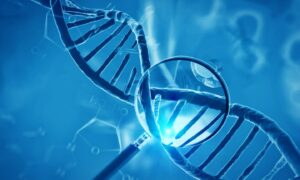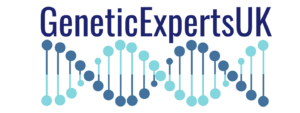What is Breast Cancer Genetic Testing?
Breast Cancer genetic testing is the most appropriate genetic test for individuals diagnosed with breast cancer. It examines the DNA code for 12 genes which are known to cause an increased risk of breast cancer and it is performed on a blood or saliva sample.
The following genes are tested:
- ATM
- BARD1
- BRCA1
- BRCA2
- CDH1
- CHEK2
- PALB2
- PTEN
- RAD51C
- RAD51D
- TP53
- STK11
More information about these genes can be found at Breast Cancer Genetics
Is this test the same as the one offered in the NHS?
Yes. This test looks at the same genes using the same technology and is just as accurate. The only difference is that NHS may not test all these genes at the same time.
What are genes?
Genes are the body’s instructions and they determine how the body develops and is maintained. Some genes prevent cancer developing: if there is a pathogenic variant in one of these cancer genes, then the gene doesn’t work correctly and this causes an increased risk of cancer. Pathogenic variants in at least 12 genes can cause an increased risk of breast cancer and other cancers.

How common are pathogenic variants?
Most breast cancer occurs by chance and approximately 80% is diagnosed over the age of 50. However, 5-10% of breast cancer can be inherited; the exact risk depends on the type of breast cancer and your family history. Our genetic counsellor can give you an indication of your personal risk.
How do I know if I am at risk?
Individuals with hereditary breast cancer generally show one or more of the following clues:
- Breast cancer diagnosed before the age of 45
- Triple negative breast cancer (ER negative, PR negative and HER2/neu negative)
- Bilateral breast cancer (cancer in both breasts)
- Several relatives with breast or prostate cancer
- One or more relative with ovarian or male breast cancer
- Jewish ancestry
What will the test show?
There are three possible results:
- A pathogenic variant is found in one of the genes which is known to increase the risk of breast cancer. This may change the treatment of your current cancer as well as future cancer screening
- A variant of uncertain significance or VUS is identified but whether or not this is the definite cause of cancer is unknown. Most VUS are later shown not to be the cause of cancer and therefore this would not change your cancer treatment or screening.
- No variant is found and the cause of your cancer is not identified. Cancer screening may still be beneficial for your relatives.
What does it mean if I have a pathogenic variant?
If you have a pathogenic variant this will explain why you’ve developed breast cancer and means that you have an increased risk of breast cancer and possibly other cancers in the future. Your exact risk(s) will depend on which gene mutation has been found.
You may wish to consider more extensive breast surgery: for example, some women with BRCA pathogenic variants may consider bilateral mastectomy rather than localised treatment; while some women with ATM pathogenic variants may chose to have a mastectomy rather than lumpectomy to avoid the need for radiation. Some genetic variants may also alter the best type of chemotherapy.
Additionally genetic testing may indicate a risk of future cancers and therefore guide appropriate cancer screening. Depending on the specific genetic risk, different screening tests can be arranged, and risk-reducing strategies can be considered.
What are the implications for my family?
If you are shown to have a pathogenic variant it would be possible to offer predictive testing to other people in your family to see if they are also at increased risk. This testing would be free within 90 days, although individuals would need to pay for the initial consultation (£150). Alternatively, your relatives would be able to have genetic testing through the NHS.
If your test is normal and no variants are identified we will give screening recommendations for your relatives.
Do I have an increased risk if I’m Jewish?
There is an increased risk of a BRCA1 or BRCA2 pathogenic variant in the Jewish population with one in 40 people of Ashkenazi Jewish ancestry (2.5%) having a variant, which causes an increased risk of breast, ovarian, prostate and male breast cancer.
Why do the prices of genetic testing vary so much?
Historically genetic testing was expensive and done by a method known as sanger sequencing, which could only look at single genes. Now we are able to look at multiple genes simultaneously, using NextGeneration sequencing and therefore testing is much more affordable.
At Genetic Experts we do not add additional fees to our tests enabling us to offer them you at a more reasonable price.
How much does testing cost?
The cost for breast cancer genetic testing is £495 and insurance will usually cover this if you meet clinical criteria.
Book an initial 1 hour consultation for only £150 and find out if you are at risk and learn more.
Have a question for us?
Contact us
Don’t hesitate to contact us to find out more about genetic testing and consultations
Genetic Experts UK
Email: [email protected]
Phone: 0333 339 2680
This site is protected by reCAPTCHA and the Privacy Policy and Terms of Service apply.
Copyright © 2021 Genetic Experts UK – All Rights Reserved.
Copyright © 2021 Genetic Experts UK – All Rights Reserved.
Website created by Col-Tech Group

